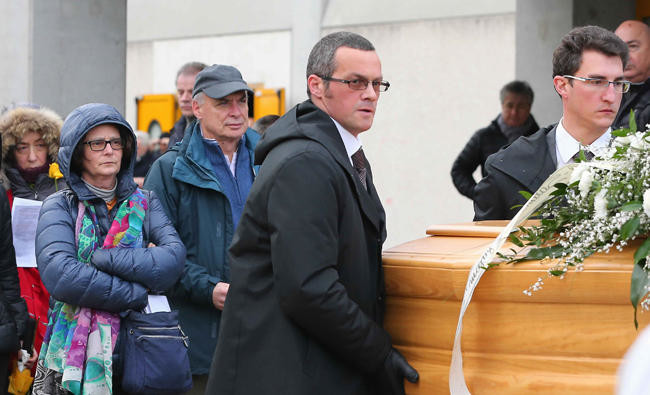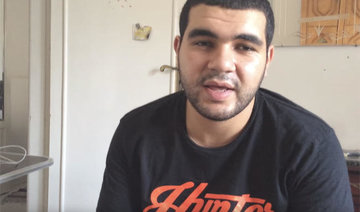CAIRO: Egypt on Wednesday acknowledged the detention of a human rights lawyer who went missing on his way to a UN conference on forced disappearances, accusing him of disseminating fake news.
Ibrahim Metwally, who was arrested at Cairo International Airport three days ago and initially held incommunicado, may have been targeted because he provided legal aid to the family of Giulio Regeni, an Italian graduate student who was abducted and tortured to death in 2016 during a police crackdown in Cairo.
Regeni’s killing sparked a major diplomatic row with Italy, which said Egyptian authorities had not fully cooperated with investigators and withdrew its ambassador in protest last year. On Wednesday a new ambassador arrived, signaling an improvement in relations.
Egyptian authorities have denied any involvement in Regeni’s killing, but activists say it bore the hallmarks of police brutality. Regeni went missing in Cairo on Jan. 25, 2016, when police were out in force to prevent protests, and his body was found days later, bearing the signs of intense torture.
The Supreme State Security Prosecution on Wednesday acknowledged Metwally had been detained, and ordered him held for 15 days in Cairo’s sprawling Tora Prison complex pending investigations. It said he was interrogated Tuesday night.
Egypt has severely limited the work of the country’s human rights community amid a wider crackdown on dissent since the military overthrew an elected Islamist president in 2013. Authorities have imposed travel bans and frozen the assets of several prominent human rights advocates in recent years, and parliament has passed legislation banning most foreign funding for rights organizations. In recent months Egypt has also blocked hundreds of websites, including many run by rights groups.
The Egyptian Commission for Rights and Freedoms said authorities should immediately release Metwally, drop all criminal charges against him, and report on steps taken to investigate and ensure accountability in the case.
“He was charged with managing a group created against the law, spreading false news, and cooperation with foreign organizations,” it said in a statement, adding that family members and lawyers only discovered Metwally’s whereabouts Tuesday evening, while his home was raided.
Metwally co-founded Egypt’s Association of the Families of the Disappeared after his own son vanished in July 2013 during clashes at an Islamist protest.
An expert on the matter who has been lobbying Egyptian authorities on the issue since 2014, Metwally had been invited to speak to the UN Working Group on Enforced Disappearances.
Egyptian authorities have taken similar measures against other rights advocates who have tried to travel abroad to take part in international forums, in what critics say is an effort to conceal its poor human rights record.
Egypt acknowledged Metwally’s detention hours before the new Italian ambassador, Giampaolo Cantini, arrived in Cairo. The new envoy has been tasked with pursuing the Regeni case, which outraged many in Italy and sparked a popular campaign to pressure officials to uncover the truth.
There was no media access to Cantini’s welcoming ceremony at the VIP lounge of Cairo’s international airport.
Pier Antonio Panzeri, chair of the European Parliament’s Subcommittee on Human Rights, said it was “unacceptable that a prominent lawyer should vanish at an airport,” and urged Egyptian authorities to ensure Metwally’s “immediate and unconditional release.”
“The continued practice of detaining the families of people subjected to enforced disappearance reflects the persistent trend of harassment and intimidation of human rights defenders, lawyers and ordinary citizens by the Egyptian authorities through the misuse of the criminal justice system,” he said in a statement late Tuesday.
Rights groups say enforced disappearances and torture are endemic in Egypt. At least two other individuals have disappeared this year after following up on cases of friends or relatives secretly detained by authorities.
Ahmed Abdullah, another lawyer who assisted the Regeni family, was tried on similar charges to those leveled against Metwally and at one point faced the death penalty during his 4 ½ months in prison before he was released.
“It’s very dangerous working on this case, and now with the return of an Italian ambassador the regime is becoming emboldened to sweep it away,” he said. “But Giulio was one of us, he was killed like an Egyptian and he deserves the truth be told, so we will not give up in obtaining justice.”
Just after the new Italian ambassador arrived, the Egyptian Interior Ministry, which is in charge of police, announced it had signed a joint protocol with its Italian counterparts to train African police to combat organized crime and illegal immigration.
“It reflects the confidence of the Italian and European security services in the expertise of the Egyptian security services,” the ministry said in a statement.
Egypt acknowledges secret arrest of rights lawyer
Egypt acknowledges secret arrest of rights lawyer

Israeli strikes in Gaza kill 12

- Strikes hit locations in northern and southern Gaza, including an apartment building in Gaza City and a tent in Khan Younis
DEIR AL-BALAH, Gaza Strip: Hospitals in Gaza said Israeli strikes killed at least 12 Palestinians Saturday, one of the highest tolls since an October agreement aimed at stopping the fighting.
The strikes hit locations in northern and southern Gaza, including an apartment building in Gaza City and a tent in Khan Younis, officials at hospitals that received the bodies said. The casualties included two women and six children from two different families.
The Shifa Hospital said the Gaza City strike took killed a mother, three children and one of their relatives, while the Nasser Hospital said a strike in a tent camp caused a fire to break out, killing seven, including a father, his three children and three grandchildren.
Gaza’s Health Ministry has recorded more than 500 Palestinians killed by Israeli fire since the start of the ceasefire on Oct. 10. The ministry, which is part of the Hamas-led government, maintains detailed casualty records that are seen as generally reliable by UN agencies and independent experts.
Israel’s military did not immediately respond to questions about the strikes.














